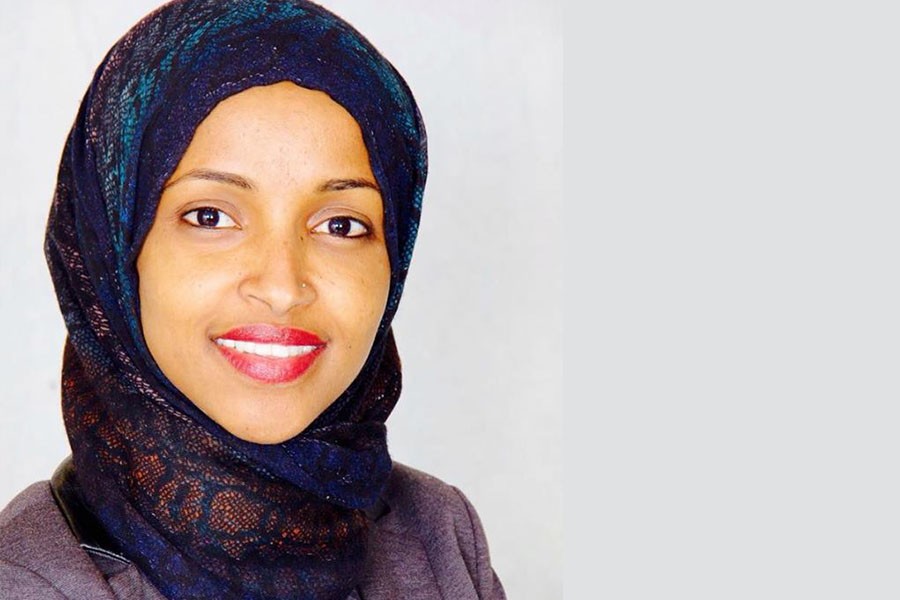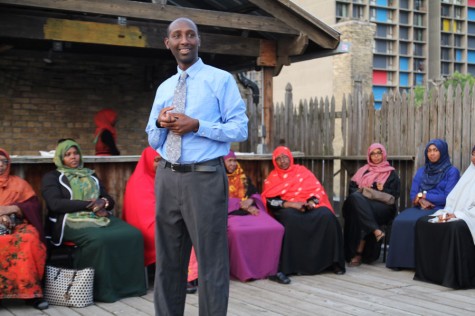Meet Ilhan Omar: the impressive woman, activist, and candidate
Ilhan Omar is currently the Director of Policy & Initiatives with Women Organizing Women (WOW) Network, and now a candidate for State Representative in District 60B.
On a Wednesday evening at Mapps Café in the Cedar Riverside neighborhood, Ilhan Omar appears a smiling, genuine member of the community who seems to know and greet almost everyone who walks in.
The hard-working politician, the down-to-earth mother of three, and justice-seeking activist embodies a premier example of a candidate who wants to truly represent their community. Though she’s currently seeking a seat in the Minnesota House of Representatives for district 60B, Omar’s background is a mix of student and youth organizing, food and economic justice, racial justice, city council campaigns, and more.
Her work in policy was largely derived from Omar’s innate interest, rather than a familial tradition or influence. “My fascination with politics began at the age of 14. It began with helping my grandfather as his language and cultural translator. We come from Somalia, and he only participated in an election I think once in his lifetime,” said Omar. The country was later taken over through dictatorship, which left Omar’s grandfather “yearning for participation and having a voice in all of that,” said Omar.
Wasting no time to begin justice work, Omar played an instrumental role in organizing retreats for her peers, teachers, and principals––as a high school freshman. “We would organize retreats and listening sessions for our teachers, for our principal and each other. It was interesting to have these conversations about things that their [the teachers’] parents and ancestors talked about and went through––but it was a real thing for us. We had just fled war. So that was kind of good to connect on humanity and our stories of compassion and to have a space where we could all grow together,” Omar said.
Through youth organizing, Omar got involved with food and economic justice. However, there were many obstacles in trying to mobilize people on nutrition issues when so many of them were barely making ends meet as it was: “I got lured into doing policy work because it was really hard to have a conversation with people who were just arriving in the country who were struggling with finding employment, finding housing, finding stability in their day to day,” Omar said.
For Omar, many of the lessons she learned through meeting with people from marginalized, predominantly immigrant communities, related back to her grandfather’s example of the power of democracy. “I recognize that I had access to influencing who was in positions of power, and getting people in positions of power that understood our struggles and that weren’t only keen on getting our votes – people who really wanted to make an impact,” Omar said.
All these experiences have led Omar to the decision to run against democratic, 42-year incumbent Phyllis Kahn. Kahn’s tenure alone is something that has stopped potential challengers from the seat in the past, and her collective educational background from Cornell, Yale, Princeton and Harvard doesn’t propose much more ease.
But intimidation doesn’t seem to appear a component at all in Omar’s campaign. Rather, she approaches the election with positivity and genuine appreciation for democracy: “I think I carry a particular optimism as a person whose parents didn’t have access to the ability to make change through policy. So I have optimism in knowing that we have an opportunity to truly do things here [in 60B]. I come from a line of educators, so making this really daunting experiencing of caucusing and getting involved in party politics can be scary and time-consuming. But I want to explain to [my constituents] that this is for all of us. This isn’t just for certain ages or races. It’s up to us to show up, to take our seats, and participate,” Omar said.
In fact, intimidation has never been a part of Omar’s agenda, neither personally nor professionally. On February 4, 2014, at the caucus for Mohamed Noor against Phyllis Kahn, Omar was physically beaten so badly that she ended up with a concussion. Although caucuses are designed to foster democratic values amongst party members alike, the 2014 caucus was anything but. Although some details remain unclear, the incident was spread widely and quickly.
This experience would make almost anyone take a break to rest and reevaluate. “Everybody was in the house when I arrived. They were saying things like ‘you’re done [with political work] – this is crazy,’” Omar said. Omar was aware of threats against her at the caucus, but she showed up anyway.
After listening to the advice of her sister, she wanted to take the week off of work to focus on rehabilitation. But her leave of absence from the political field didn’t come; she went to work the next day. “I was sitting on the couch and my daughter came and said, ‘you’re not getting dressed?’ and I responded, ‘getting dressed for what?’ ‘work – you’re not going?’. I said no, and that I’d be taking some time off,” Omar said.
Omar’s daughter seemed to focus on her mother’s immediate reaction to the incident – stressing the importance of a confident disposition. “Let me get this straight: one of the people who is responsible for this happening to you works at City Hall too. So, if you don’t show up to work today, they know they won. Go get dressed, I’ll help you get ready, and make sure you sit in the committee he sits in so he sees your face,” Omar’s daughter said. And she did just that.
Taken aback by the mature insight of her daughter, Omar took the high road and turned her discomfort into action – and a memorable one at that. “I wanted to just cry. She was right: what message do I send to my daughter and to a lot of the other young women who are often afraid of getting involved in politics – especially in communities where there is patriarchy? Yes, I’m hurt, and I’m in pain, but I need to go and be brave for them,” Omar said. Her bosses, co-workers, constituents, and family were shocked by the city councilwoman’s quick turnaround, but it’s not something she regrets in the least bit.
Overall, the Minnesota House district 60B, comprised largely of students and minority families, is not easy to win over. But the challenge doesn’t appear a major area of concern for candidate Omar. By approaching her campaign with optimism rather than intimidation, empathy as opposed to apathy, and energy rather than lethargy, Omar is crafting a campaign to turn 60B into a tight-knit, self-aware community––an approach that could soon become a reality.
For campaign updates, be sure to keep up with her Facebook page.



















































Hakim Kassim. • Aug 26, 2016 at 6:53 am
Only in America does a person like ILHAN OMAR has a chance of rising up and out of a patriarchic, hopelessly male-dominated society, and make it all by her little self; only in the United States could a poor struggling girl like Ilhan Omar, an immigrant with her native land destroyed and mired in endless mud-slings of civil strife, successfuly assert herself in self-worth, and show us all the decent, honorable and good person that she is; and only in America can Ilhan Omar, as beautiful and brilliant as could possibly be seen nowadays, dare reap such genuinely-concerned and visionary ideas by which to lead her fellow citizens out of conflict and chaos and into equitable and adequate social and economic life: God Bless ILHAN OMAR for her brilliant vision, her heart-felt concern, for her indomitable and resolute spirit, and for her courage in times of crisis!